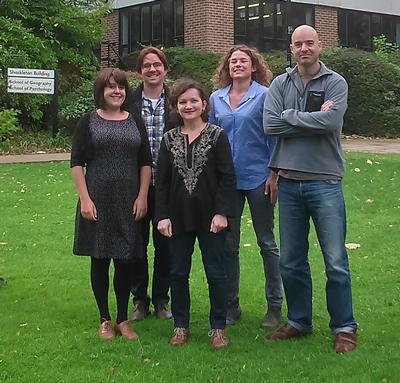New staff expand expertise and bring collaboration potential

Geography and Environment has welcomed seven new experienced academics to its team strengthening its existing expertise in economic, cultural and environmental geography.
The new staff will bring new research specialisms and enthusiasms to the department’s geography teaching programme.
Head of Geography and Environment Professor Stephen Darby comments: “The arrival of our new staff heralds exciting times, and I am delighted to welcome everyone. We are extremely fortunate to have been able to recruit so many talented and dedicated professionals. I am very much looking forward to seeing the contributions that they will make, not only to addressing a range of global challenges through their research, but to the further enrichment of our undergraduate curriculum.
“I am especially pleased that we have been able to recruit so many from overseas. With geographical research and graduate employment markets becoming increasingly globalised, our existing colleagues and students will benefit greatly from the diverse range of experiences that our new colleagues bring. We will continue to seek to recruit outstanding academics to help deliver the next phase of our strategic plan."
The new staff bring a range of expertise in the following areas
Internal and international migration
Dr Julie Vullnetari joins from the University of Sussex. She is interested in the links between internal and international migration from a development perspective. Her new third year module is entitled Migration and Development.
Hidden, overlooked and forgotten environments
Dr Bradley Garrett joins from the University of Oxford. He is interested in ruins and waste; material culture and heritage; highlighting hidden, overlooked and forgotten environments, places and histories. He has recently published a new book Subterranean London that has been featured in The Guardian and was a key presenter at TEDxVienna’s CITYx, in Vienna. His new module Experimental Geographies focuses on practical experimentation in research, including film and video methodologies. He will also add his expertise on exploring cities to the second year Amsterdam field trip team.
Single-life in contemporary Britain
Dr Eleanor Wilkinson [FC1] joins from the University of Leeds and is currently researching a major British Academy-funded study of single-life in contemporary Britain. She has been awarded an ESRC Future Research Leaders award worth more than £236k for a new project on ‘Hitting Home: Single People, Housing Benefit Reform & Equalities Law’ and will be teaching two core second year modules - Cultural Geography and Geographies of Wellbeing.
Digital technologies and global competition in the creative economy
Dr Brian Hracs joins from Uppsala University in Sweden and is researching how digital technologies and global competition are influencing entrepreneurs in the creative economy. He is putting together a book entitled The Production and Consumption of Music in the Digital Age. His third year module is The Creative Economy. He will also be contributing his expertise to the first year core module A Global World and will provide key contributions to the human geography component of the first year Southampton-based field trip that examines the local, social and economic landscapes of the city.
Internationalism on labour markets
Dr Tom Kemeny joins from the London School of Economics and is examining innovation and learning in regional development and growth, looking at the impact of internationalisation on labour markets. He will teach on the core second year Economic Geography module. He will also be contributing his expertise to the first year core module A Global World and will provide key contributions to the human geography component of the first year Southampton-based field trip that examines the local, social and economic landscapes of the city.
Dynamics modelling and complexity science
Dr James Dyke, from Electronics and Computer Science at Southampton, joins the Global Environmental Change and Earth Observation (GECEO) research group. He is interested in dynamics modelling and complexity science. James writes a regular column Eccentric Orbitsfor the independent news and analysis website The Conversation. A current article of his calling for a Nobel environment prize was picked up in The Ecologist.He also recently hosted TedXSouthamptonUniversity and is due to give the opening address at the Southampton International Development Conference. Later in the year he will compare an evening at the Turner Sims with environmental lawyer Polly Higgins who will be giving a talk on ecocide – the extensive damage or destruction of the natural landscape or ecosystem.
Environmental economy
Dr Marije Schaafsma previously worked at the universities of Cambridge and East Anglia and also joins the GECEO research group. She is an environmental economist opening up great potential to collaborate and build links to existing and new projects both within GECEO, in Geography and Environment and across the University. Marije is a NERC (Ecosystem Services and Poverty Alleviation) “tenure track” Research Fellow.
